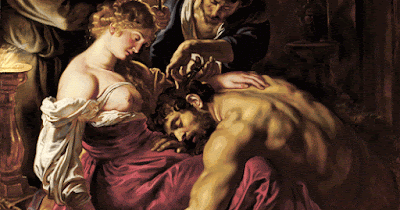Here on the shore of Ashkelon we have reached the end of recollection
like rivers reaching the sea.
The recent past sinks into the distant past,
and what’s distant rises from the depths over what’s recent.
Peace to what’s recent and Peace to what’s distant.
Here among the fragments of sculpture and columns
I ask, how did Samson topple the temple
in which he stood blind, and said, “Let me die with the Philistines”,
Did he hug the columns like his latest love,
or push them away from himself with his arms, like so,
to be alone in his death?
כָּאן בְּחוֹף אַשְׁקְלוֹן הִגַּעְנוּ אֶל סוֹף הַזִּכָּרוֹן
כָּמוֹ נְחָלִים שֶׁמַּגִּיעִים אֶל הַיָּם
הֶעָבָר הַקָּרוֹב שׁוֹקֵעַ בְּתוֹךְ הֶעָבָר הָרָחוֹק
וְהָרָחוֹק עוֹלֶה מִמַּעֲמַקִּים עַל הַקָּרוֹב
שָׁלוֹם שָׁלוֹם לַקָּרוֹב וְלָרָחוֹק
כָּאן בֵּין שִׁבְרֵי פְּסָלִים וְעַמּוּדִים
אֲנִי שׁוֹאֵל, אֵיךְ שׁמְשׁוֹן הִפִּיל אֶת הַמִּקְדָּשׁ
שֶׁבּוֹ עָמַד עִוֵּר, וְאָמַר, תָּמֹת נפְשִׁי עִם פְּלִשְׁתִּים
הַאִם חָבַק אֶת הָעָמּוּדִים כְּמוֹ בְּאַהֲבָה אַחֲרוֹנָה
אוֹ דָּחַף אוֹתָם בִּזְרוֹעוֹתָיו מִמֶּנּוּ וָהָלְאָה
לִהְיות לְבַדּוֹ בְּמוֹתוֹ
This article reminded me of this poem.
In this poem Yehuda Amichai lightly mimics and gently mocks the book of Ecclesiastes, and poses an important question about Samson's loyalties and existential state just before his death.

Very nicely done
ReplyDelete